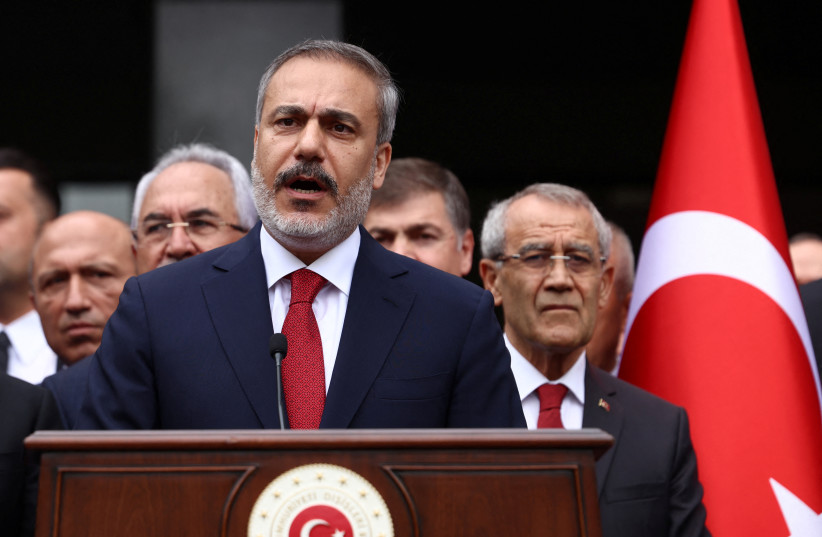Turkish Foreign Minister Hakan Fidan suggested that a Chinese and Russian-led economic organization may be his country’s alternative to the EU following a series of high-level talks between his country and Eastern-aligned groups and officials.
Turkish officials have met with Chinese and Russian counterparts in the last two months. Turkish President Recep Tayyip Erdoğan is set to attend a meeting of the China-led Shanghai Cooperation Organisation (SCO) on July 3 in Astana, Kazakstan, where he is expected to meet Russian President Vladimir Putin.
Fidan made the comments on Monday night about BRICS, an economic group of developing countries that includes China, Russia, and recently Iran.
Bloomberg reported that he stated that an “economic alliance has not materialized” in reference to the EU, which Turkey has been waiting for decades to join, and that a search is underway.
It will be a month after Turkish Foreign Minister Hakan Fidan went to Beijing for the highest-level meeting of a Turkish official in China since 2012.

The war in Gaza may have motivated Beijing to increase cooperation with Turkey.
Nilgun Elikucuk Yildirim, an associate professor of international relations at Atılım Üniversitesi who focuses on China-Turkey relations, told The Media Line that Beijing believed that Ankara was playing an important role among Muslim-majority countries during the war in Gaza.
“We see how China actually attributed importance to Turkey when it comes to Gaza and cooperation among the Muslim countries during [Fidan’s] visit to China,” Yildirim said.
During a joint press conference, Fidan and Chinese Foreign Minister Wang Yi reiterated the need for a ceasefire in Gaza.
Chinese FM Wang Yi's statement
Wang said that increasing cooperation with Turkey will increase chances of finding a solution to “the Palestinian issue,” the Turkish news outlet Hurriyet reported.
Wang also said that his country was interested in increasing cooperation with Turkey to oppose “hegemony and power politics” in trade, energy and technology, the South China Morning Post reported.
Turkey’s geographic position, bordering Iran, Syria, and Iraq and sharing a maritime border with Ukraine and Russia in the Black Sea, makes it a strategically valuable ally to its NATO partners.
Experts say Turkey has been attempting to balance its security reliance on NATO with stronger relations with Eastern countries, especially Russia and China, to gain more geopolitical independence.
The meeting between the foreign ministers followed talks between the Turkish energy minister and Chinese officials and companies in May.
Local media reported that the Turkish president stated in 2022 that he hoped his country would gain membership in the SCO, whose members include Iran, India, and Pakistan.
Yildirim said that China has been gaining a foothold in Turkey through businesses, such as providing telecommunications for the Istanbul airport.
“China is actually influencing or… injecting something into the Turkish system as a member of NATO, especially in the realm of intelligence,” Yildirim said.
“It is not necessary to become a part of [the SCO]. China is there.”
Yusuf Can, an analyst at the Wilson Center’s Middle East program, believed that Turkey’s role in NATO makes its participation especially appealing to Beijing as it competes with the West for international clout.
“As a NATO country, Turkey’s significant interest in BRICS presents a valuable public relations opportunity for China and the organization as a whole within the global community,” Can wrote in a message to The Media Line.
During the Turkish foreign minister’s visit to Beijing, he reportedly stated that his country would also like to join BRICS. Russia welcomed this sentiment, while the US Ambassador to Turkey, Jeffrey Flake, told the Reuters news agency that Washington opposed such a move.
Fidan then attended an organization meeting and met with Russian President Vladimir Putin about a week after his meeting with the Chinese foreign minister.
Can believes Turkey wants to increase its diplomatic ties amid an increasingly unstable global context, and the war in Gaza has strengthened Ankara geopolitically.
“It has bolstered Turkey’s position against the backdrop of the West’s declining popularity in the global community, and especially in the global south,” Can stated.
He added that Turkey hopes participating in these meetings will lead to more global influence, a motivation that has been strengthened as the world order has shifted towards more diverse sources of power.
“By expanding its diplomatic relations, Turkey wants to enhance trade opportunities and, given its growing military ambitions, potentially increase arms trade with new buyers,” he stated.
